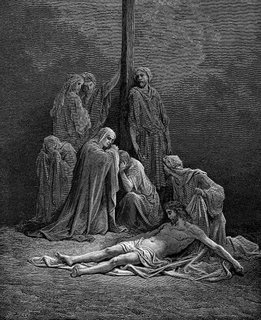 Possibly the thing that surprised me most about the Wayne Adam Ford case was that, despite his surrender and admission of guilt, the jury still recommended death. I’ve always assumed that contrition matters for something. But serial killers may be another story.
Possibly the thing that surprised me most about the Wayne Adam Ford case was that, despite his surrender and admission of guilt, the jury still recommended death. I’ve always assumed that contrition matters for something. But serial killers may be another story. The Crime Library described Ford as "the remorseful serial killer," and said this about his apparent penitance:
Carlton Smith suggested in his book Shadows of Evil, the chances of a serial killer turning himself in and showing remorse for his victims is extraordinarily small. In fact, San Francisco State University Criminologist Mike Rustigan stated in an Associated Press article that Wayne's confessions were "truly an exception in the annals of serial killers." Wayne's apparent shame for his brutal crimes earned him the nickname the "serial killer with a conscience."
Serial killer with a conscience? That seems like an oxymoron.
Nevertheless, the Bible gives us several examples of murderous men who repented. In fact, three of the greatest Bible figures were killers or accomplices. Moses killed an Egyptian and fled to the wilderness and David successfully plotted the murder of Bathsheba's husband. Furthermore, before his conversion, the apostle Paul systematically hunted Christians. But in spite of their acts and various degrees of hardened hearts, God churned inside these men.
While it can be argued that serial killing is different than first degree murder, it cannot be argued that first degree murder shouldn't be equally punishable by death. (Under the laws of some states, Kind David would certainly be recommended for execution.) Either way, none of these "killers" were too far for God to apprehend.
While the Bible suggests there is a state where repentance is impossible (Heb. 6:4-6) and where the heart is terminally hard, the parameters of that condition are anything but clear. A show of conscience can be one of the most important evidences for a redemptive hope. But discerning that evidence is not always easy.
Especially when the individual in question has left a trail of death behind them.
One of the reasons I remain conflicted about capital punishment is our inability to know exactly what's going on inside the heart. Was Mr. Ford genuinely sorry, or just sorry he got caught? Furthermore, should any apparent remorse have bearing upon his sentencing? The record seems to imply Ford was tormented about his crime; he summoned his brother to confess, and eventually turned himself in to the police. To me, this type of inner turmoil points to a conscience that is not yet dead. Either way, judging between a penitent soul and a reprobate mind is too hard a task, one that none of us can ever make with 100% accuracy -- it is something best left to God.
There is, in all this, a clear distinction between the role of government and the role of the Church. One of the commentators in the previous post wrote this:
As Christians, we are called to forgive. We are called to witness. We are called to love the unlovable.
But the government is ordained to stand in the place of God Himself when it comes to punishing the wicked, not as God the Loving, but as God the Avenger. Romans 13 makes it completely clear what the government's role is to be (one could even argue that it's the only true role given by God TO the government in Scripture).
Can I attempt to love and forgive the person who murders someone I know and love? As an imitator of Christ, it is absolutely required of me to do so! But at the same time, my government is required by God to punish that person. And "the sword" does not mean therapy.
This is a terrific point, but exactly how does Christian mercy -- the Church's call to "forgive" and "love the unlovable" -- and "the sword" interface? Can they?  The death penalty can easily be established under Old Testament law. The New Testament is another story. Apart from Romans 13, I'm unaware of any verses that compel Christians to endorse the death penalty. In fact, according to Christ, the law was fulfilled in Him, supplanted by a higher set of principles. We no longer stone adulterers and witches; we pray for those who use us and turn the other cheek. Of course, this does not mean we are flippant with forgiveness and socially reckless, but that love and grace and mercy tempers our judgements.
The death penalty can easily be established under Old Testament law. The New Testament is another story. Apart from Romans 13, I'm unaware of any verses that compel Christians to endorse the death penalty. In fact, according to Christ, the law was fulfilled in Him, supplanted by a higher set of principles. We no longer stone adulterers and witches; we pray for those who use us and turn the other cheek. Of course, this does not mean we are flippant with forgiveness and socially reckless, but that love and grace and mercy tempers our judgements.
And that's what I'm wrestling with. How do we uphold the call to judge right and still render mercy? How can I pull the switch on someone else, when I deserve to be executed a hundred times over?
If we live by "an eye for an eye," the whole world will eventually go blind.
There is a God who will avenge the weak, balance the scales and lay bare the secrets of men's hearts. I am not Him. He knows what Wayne Adam Ford deserves. I don't. I do know that God offered His Son to be executed for sinners like me. He turns at the slightest hint of remorse, as the filthy Prodigal stumbles home broken and spent, and meets the wayward soul with grace. And He calls me to do the same...

5 comments:
Re: Government vs. Individual
As far as I know, yes, Romans 13 is the only passage in the New Testament that addresses this topic. But that's because the vast majority of the NT is about how we should live as individuals, as Christians, in our personal lives. Paul and the other writers weren't concerned with giving instructions to governments/legal authorities. In fact, Romans 13 was only reiterating the basis for human government that God had given way back in Genesis 9:6 (which predates the Mosaic Law and is therefore not included in any discussion of what Christ meant by "fulfilling" the Law).
Moses, David, and probably Paul all absolutely deserved the death penalty under all this. However, it's up to the government, not individuals. Paul's government sanctioned his actions. Moses was apparently forgiven by the Egyptian government when he returned. And David WAS the government, so it was up to God Himself to determine appropriate punishment (and one could easily make the case that David's punishment was far worse than death).
There are always consequences for sin. Forgiveness, yes. But forgiveness doesn't invalidate what happened or the consequences for it.
Some of my absolute favorite stories are about people who have committed incredible crimes and yet find redemption. I love how God can transform people. But at the same time, I cannot turn against the clear teaching of Scripture that it is the government's responsibility to punish the crime - not as a deterrent, but as a punishment.
Wow, I've babbled a lot. I think you make a very good case, Mike, and it's all the more thoughtful and provoking in that you didn't even go near the standard "Jesus forgave the woman caught in adultery!" argument.
I agree that forgiveness doesn't neccesarily mean no consequences. I had sex before I was married. Eventually, I was very sorry, but I was still pregnant. God forgave me. I married a non-Christian even though I knew it wouldn't be God's choice. Once I realized how difficult a relationship it could be, I was sorry. God forgave me, but called me to stay faithful and love my husband (who is a believer now).
Where am I going with this? let's see... the murderer can be as sorry as can be. That repentant heart can bring him forgiveness, and maybe peace. But it can't bring back his victims or ease the pain in the hearts of their families. And I don't think it should eliminate the consequences of his crime. David Berkowitz (son of Sam killer) is born again and serving God in prison where he'll be for life. He is very sorry and says that it is right for him to be in prison. I guess the main point is that the repentant heart that seeks God DOES receive mercy. Even if he is put to death in an electric chair, he goes instantly to be with the Lord. He receives eternal life! I don't know if the punishment should be death. Maybe it should be life in prison. But there should be punishment.
Guess it's a day for babbling. Great post Mike. You made me think. Again. Now I have a headache.
You've identified a really hard question, Mike, especially in a democracy, where I might be called to be on the jury during a killer's trial. I've received consolation, knowing that my religious convictions would probably mean I would never be chosen for said jury, but the question is valid. When I am on that jury, am I then part of the government?
And you are absolutely right. We do not know the heart of a man, to know if there is a window of hope that his remorse will take him to repentence or not.
I think this is very much one of those "conscience" issues. If you as my brother in Christ opted for a consciencious objection stance when it came to the death penalty, I'd support you completely. And if my brother in Christ Tim took the position that he'd vote on that jury for the death penalty, I'd support him one hundred percent. I don't know that God gives us all the same conviction.
I hope that's not a cop out. I'm pretty sure I couldn't kill someone. I also believe the government should have the death penalty to bring peace to society.
But there we are again--what should be and what is with the government's system of justice ...
Becky
I guess we can hope and pray that, if Wayne Adam Ford is truly repentent, God will reveal Christ to him and redeem his soul before he dies. God is certainly able to do it.
Thanks for this thoughtful series. When this topic comes up in conversation, I just may direct people to your archives.
Thanks for the comments, everyone. I am not on a crusade against the death penalty, but understand how someone could be. I am genuinely conflicted and the thoughts here are meant to be more evidence of my disquietude than an apologetic against capitol punishment. I've rendered similar thoughts in a more poetic form in my essay Of Saints and Serial Killers, which juxtaposes the depths of our depravity against the heights of grace. Thanks again for the wonderful spirit of dialogue.
Post a Comment